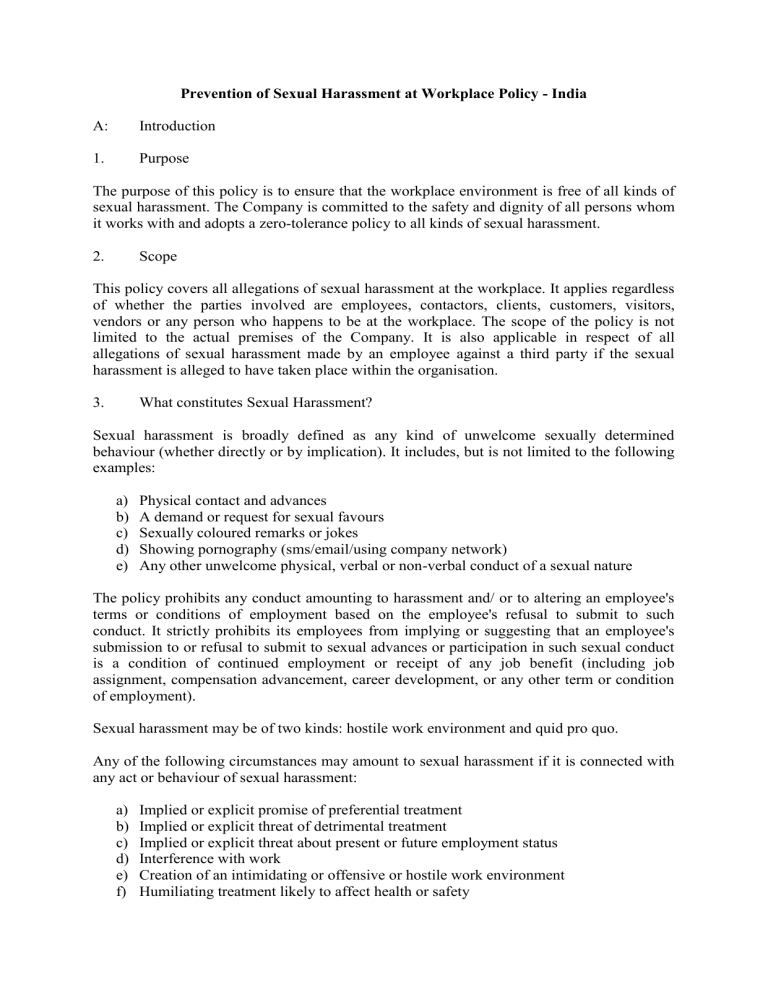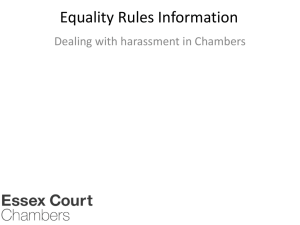Prevention of Sexual Harassment at Workplace Policy

Prevention of Sexual Harassment at Workplace Policy - India
A: Introduction
1. Purpose
The purpose of this policy is to ensure that the workplace environment is free of all kinds of sexual harassment. The Company is committed to the safety and dignity of all persons whom it works with and adopts a zero-tolerance policy to all kinds of sexual harassment.
2. Scope
This policy covers all allegations of sexual harassment at the workplace. It applies regardless of whether the parties involved are employees, contactors, clients, customers, visitors, vendors or any person who happens to be at the workplace. The scope of the policy is not limited to the actual premises of the Company. It is also applicable in respect of all allegations of sexual harassment made by an employee against a third party if the sexual harassment is alleged to have taken place within the organisation.
3. What constitutes Sexual Harassment?
Sexual harassment is broadly defined as any kind of unwelcome sexually determined behaviour (whether directly or by implication). It includes, but is not limited to the following examples: a) Physical contact and advances b) A demand or request for sexual favours c) Sexually coloured remarks or jokes d) Showing pornography (sms/email/using company network) e) Any other unwelcome physical, verbal or non-verbal conduct of a sexual nature
The policy prohibits any conduct amounting to harassment and/ or to altering an employee's terms or conditions of employment based on the employee's refusal to submit to such conduct. It strictly prohibits its employees from implying or suggesting that an employee's submission to or refusal to submit to sexual advances or participation in such sexual conduct is a condition of continued employment or receipt of any job benefit (including job assignment, compensation advancement, career development, or any other term or condition of employment).
Sexual harassment may be of two kinds: hostile work environment and quid pro quo.
Any of the following circumstances may amount to sexual harassment if it is connected with any act or behaviour of sexual harassment: a) Implied or explicit promise of preferential treatment b) Implied or explicit threat of detrimental treatment c) Implied or explicit threat about present or future employment status d) Interference with work e) Creation of an intimidating or offensive or hostile work environment f) Humiliating treatment likely to affect health or safety
These examples provide some guidelines for unacceptable behaviour in the workplace which all employees are prohibited from practising. These examples are not exhaustive and employees are to err on the side of caution and refrain from any practices that might be considered to be sexual harassment.
B: Ensuring a Workplace Free of Sexual Harassment (The Complaints Procedure)
4.
The Internal Complaints Committee (“ICC”)
The Company has established an ICC that will investigate all allegations of sexual harassment, assist with the making of complaints, ensure that any offenders are suitably punished and protect the welfare of aggrieved employees. The members of the ICC have been carefully selected to ensure that there is a good gender balance on the committee and that there are members with special expertise regarding sexual harassment.
The ICC will render all reasonable assistance to anyone making a complaint of sexual harassment. Employees are reassured that their complaints and the subsequent proceedings are strictly confidential and will not be communicated to the public.
The Policy strictly prohibits any sort of retaliation against the complainant or any witnesses.
Any act of reprisal, including internal interference, coercion and restraint, by the alleged offender whether directly or indirectly, will result in appropriate action against the alleged offender by the management in consultation with the ICC.
5. Making a Complaint
Any aggrieved employee can make a complaint of sexual harassment at the workplace within three months from the date of the alleged incident of Sexual Harassment. Such a complaint must be made in writing, but if there are any difficulties, the ICC will render all reasonable assistance to the aggrieved employee for making the complaint in writing.
6. Immediate Action
The Company appreciates that there may sometimes be a need for immediate action to be taken even before the ICC has completed the inquiry. Any aggrieved employee may submit a request in writing for any of the following measures to be taken if required: a transfer of the aggrieved employee or the respondent to another workplace; leave for the aggrieved employee; or other measures to protect the aggrieved employee.
All requests will be considered on their merits by the ICC. The Company takes this issue very seriously and will implement the recommendations of the ICC as soon as is practicably possible.
7. Outcome of the Inquiry (Punishment of Offenders)
On receipt of a formal complaint, the ICC shall conduct an investigation into the complaint.
The investigation will be concluded within ninety days of the receipt of the formal complaint.
In the course of investigating any complaint of sexual harassment, the ICC shall ensure that the principles of natural justice are adhered to namely:
Both parties shall be given reasonable opportunity to be heard and to produce any other relevant documents before the ICC
Upon completion of the investigation, both parties, will be informed of the findings and result of that investigation
All allegations of harassment will be investigated promptly and in a confidential manner, as reasonably possible, for an effective investigation. The investigation will include interviewing the allegedly harassed employee, the allegedly harassing employee, any third party witnesses, as well as considering any other potentially relevant information.
The ICC will provide a report to the employer and the concerned parties within ten days from the date of completion of the inquiry. If the ICC concludes that the allegation against the respondent has been proved, it will make recommendations to the employer to punish the offender and/or compensate the aggrieved employee. The Company will implement these recommendations as soon as is practically possible.
The policy shall treat commission of an act amounting to sexual harassment by an employee as a disciplinary offence. Breach of confidentiality, victimisation or retaliation against an employee for bringing a complaint of sexual harassment or any witness who meets ICC to share their observations in good faith shall also be treated as a disciplinary offence.
Acts of sexual harassment will attract stringent penal consequences, including and up to termination of services.
In the event the conduct complained of amounts to a specific offense under the Indian Penal
Code, 1860 or under any other law in existence, the ICC, subject to the wishes of the complainant, shall take appropriate action in making a complaint with the appropriate authority. The ICC will actively assist and do all that is necessary to ensure the safety of a complainant in the office premises or otherwise in respect to any duties/activities perform in connection with her work which take place outside office premises.
Offenders may have the following actions taken against them: a) Be required to issue a written apology b) Be given a warning, reprimand or censure c) Have their promotion withheld d) Have any pay rises or increments withheld e) Termination of employment f) Be required to undergo a counselling session g) Be required to carry out community service
In addition, offenders may be required to pay such sums to the aggrieved woman as the ICC determines to be just compensation.
8. Outcome of the Inquiry (Compensation of the Aggrieved Employee)
The ICC will consider if (and potentially, how much) an aggrieved employee should be compensated in the interests of justice. The ICC will consider any potential losses suffered by the aggrieved employee.
9. Alternative Procedure (Conciliation)
An aggrieved employee may decide to settle the matter directly with the respondent instead of opting for an inquiry. This alternative procedure is optional and entirely up to the aggrieved employee. Both parties are free to opt for the inquiry procedure instead at any point of time.
The Company will provide support for any employees who wish to opt for this procedure instead. The parties can discuss any terms or conditions for the settlement but no monetary settlement shall be made as a basis of conciliation. If a resolution is achieved, the aggrieved employee should provide details to the ICC, who will record the settlement and provide copies to the parties. If the terms or conditions of the settlement are not complied with subsequently, the inquiry procedure can be commenced.
10. Ensuring Fair Use of the Policy
It is important that the policy and procedures are not abused. To protect the interests of innocent respondents, if the ICC finds malicious intent in the complaint or false evidence, the person bringing the complaint or raising the evidence may be subjected to the same penalties as a potential offender.
However, a mere inability to substantiate a complaint or provide adequate proof need not attract action against the complainant. Employees with genuine grievances will be treated fairly and there should not be any fear if the complaints are brought in good faith.
11. Additional Assistance
The Company will provide all reasonable assistance to an aggrieved employee who wishes to file a complaint in relation to the offence under the Indian Penal Code or any other law for the time being in force. This assistance can be provided in addition to the procedures mentioned above.
12. Details of the ICC Members
The Members of the ICC are:
Contact Details Name
Mrs. Ujjwala Apte
Mr. N K Shah
Mr. S N Shetty
022-2288 5959
0260-2642745/46
022-2288 5959
C: Ensuring a Workplace Free of Sexual Harassment (Raising Employee Awareness)
13. General Measures for Raising Employee Awareness
The Company is committed to raising awareness of the problem of sexual harassment at the workplace and has taken the following measures:
Displayed information detailing the penal consequences of sexual harassment and the order constituting the ICC
Formulated a policy for prohibition, prevention and redressal of sexual harassment at the workplace intended to promote gender sensitive safe spaces and remove underlying factors that contribute towards a hostile work environment against women
14. Workshops and other Programmes
The Company has workshops and awareness programmes planned for both employees and the members of the ICC. These will be held at regular intervals and with the intention of sensitising employees with the issues pertaining to sexual harassment at workplace.
Employees are encouraged to use these programmes as a forum for dialogue.
Members of the ICC will be provided with orientation programmes and seminars to prepare them for their duties. These programmes will also have the function of being capacity and skill building.
15. Company Formal Declaration
The Company wishes to formally declare that it treats sexual harassment as a serious form of misconduct under the company rules and policy. It will deal with this misconduct to the fullest extent of its ability. This includes the initiation of internal company programmes as well as support for engagement with external agencies like the police. The Company is strongly committed to ensuring that the workplace environment is free of all kinds of sexual harassment.
16. Modification and Review of Policy
The organisation reserves the right to modify and/or review the provisions of this Policy, so as to comply with applicable legal requirements, internal policies, or with a view to fine tune or alter the provisions of this Policy to the extent deemed necessary from time to time.
17. Policy Owner
Legal and HR function owns this policy and will be responsible for effective implementation of the policy in India.
********************







